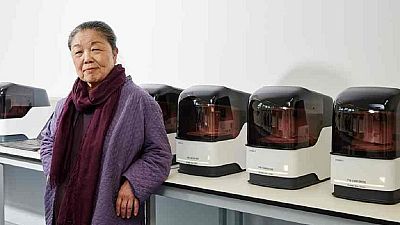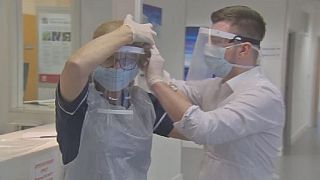AIDS
In just two hours, communicable diseases such as HIV and Hepatitis B can be detected by a rapid blood diagnostic machine, a brainchild of a team of Cambridge scientists
The Simple Amplification Array commonly known to its innovators as SAMBA, is said to be robust, simple and precise.
“It’s really quite simple; the patients come in and the sample is taken. And that then gets tested. Within 90 minutes you get the results. And so you can really decide whether the drug — their treatment is being effective or if they have developed resistance, whether they are infected or not infected, “ Dr, Hellen Lee, President and CEO of Diagnostic For The Real World.
The “Samba” device can revolutionize #HIV testing in sub-Saharan Africa with two-hour test results https://t.co/o5pBMPzbYF #globalhealth
— Dignitas Intl (@DignitasIntl) May 31, 2016
“So really you can get a result in 90 minutes of an extremely complicated test, so, if you will, normally to do this type of testing is done in a machine the size of a Mini, and we’ve reduced it to the size of a coffee machine that literally anyone can do [use],” she added
Primarily, the test can be done by healthcare workers with minimal training. Lee and her team demonstrated how the reagents and blood samples are loaded into the machine in separate, individually shaped compartments.
“For instance, this is one of the cartridges, and it needs to be so intuitive that when you open it [the machine] up and you put it in, there is only one way you can put it – you couldn’t put it wrong. And so actually we have simplified the procedure in such a way that I always say that anyone who can cook can do it.”
This piece of technology has made rounds in Malawi, Uganda and other parts of Africa, where there is high prevalence of infectious diseases. The team however experienced a few hiccups
The SAMBA 1 machine, which is the first generation of this machine, for two days it didn’t work in Malawi because the temperature in the lab went to 38 degrees centigrade.
So the team ended up having to redesign SAMBA 2 to widen the temperature, now it can go to 40 degrees centigrade.
The introduction of the machine brings with it the delivery of accurate results without the need for reagent refrigeration, thanks to innovative freeze-drying that allows the test kit not only to remain stable at room temperature.
Photograph Credit: Heinz Troll/European Patent Office
Reuters














Go to video
Immunization at risk: Global health leaders urge action amid rising disease outbreaks
01:16
Africa mourns Pope Francis, a voice for peace and justice
01:14
ECOWAS Meets in Ghana to Tackle Member Withdrawals
Go to video
Nigeria's market doctors bring healthcare directly to traders
Go to video
Nigerian Football Federation guilty of negligence in footballer's death
Go to video
EU foreign ministers discuss Ukraine, Syria and EU-African relations in Luxembourg.